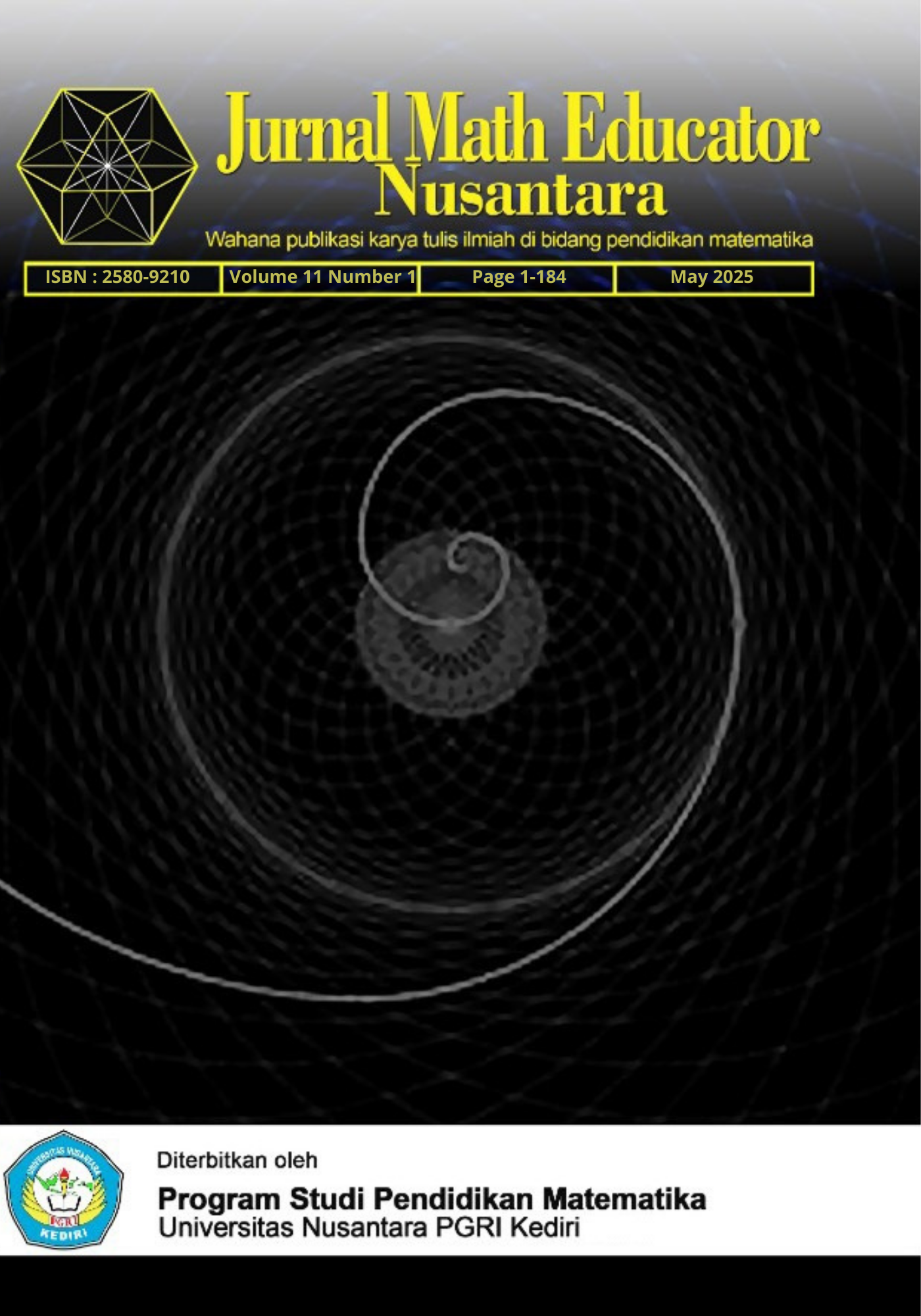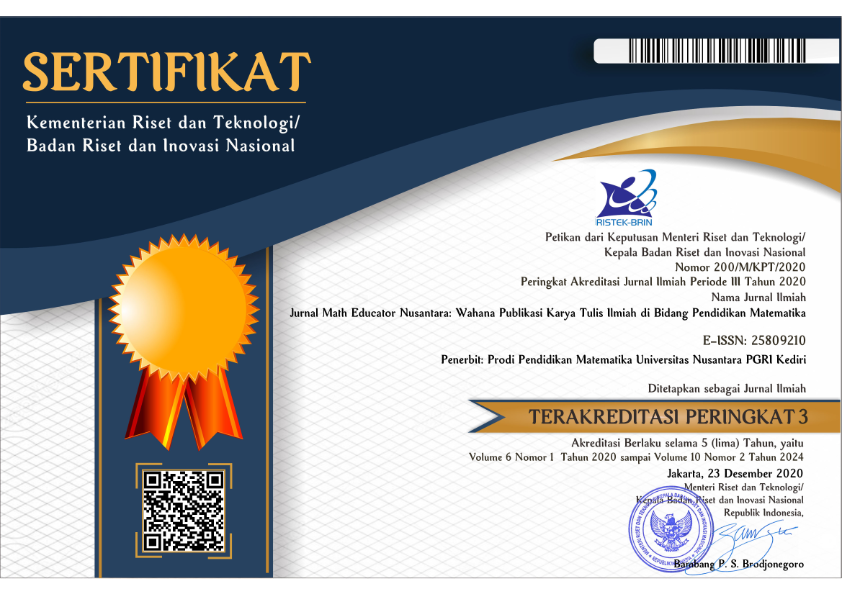Various mathematics learning models for junior high school students' mathematical representation ability: systematic literature review
DOI:
https://doi.org/10.29407/jmen.v11i1.24896Keywords:
mathematical representation ability, junior high school, learning modelAbstract
Tujuan penelitian ini adalah untuk mendeskripsikan hasil penelitian tentang kemampuan representasi matematis siswa SMP melalui berbagai model pembelajaran matematika, metode penelitian yang digunakan dalam penelitian, dan kecenderungan penelitian berdasarkan tahun penelitian. Penelitian ini menggunakan metode Systematic Literature Review dengan melakukan eksplorasi dengan bantuan Google Scholar. Berdasarkan inklusi dan eksklusi yang telah ditetapkan, diperoleh 19 artikel. Hasil analisis menggunakan Systematic Literature Review, ditemukan bahwa model pembelajaran matematika yang dapat meningkatkan kemampuan representasi matematis siswa SMP didominasi oleh model Problem Based Learning, artikel yang dipublikasikan paling banyak dihasilkan pada tahun 2020, dan jenis penelitian paling banyak menggunakan kuantitatif. Hal yang dapat meningkatkan kemampuan representasi matematis siswa SMP dalam pembelajaran melalui siswa berperan aktif dalam pembelajaran dan guru hanya berperan sebagai fasilitator, siswa belajar secara berkelompok untuk menyelesaikan masalah yang dihadapinya, siswa membangun pengetahuannya dan menemukan suatu konsep matematika secara mandiri melalui kegiatan pembelajaran, dan dapat juga melalui guru yang membuat materi matematika berdasarkan hal-hal yang ada dalam kehidupan nyata.
References
Anggraini, A., & Andriani, L. (2019). Pengaruh Penerapan Model Pembelajaran Eksploratif terhadap Kemampuan Representasi Matematis berdasarkan Kepercayaan Diri Siswa SMP. Journal for Research in Mathematics Learning, , 2 3.
Aristiyo, D. N., Rochmad, & Kartono. (2014). Pembelajaran Matematika Model Ikrar Berpendekatan RME Untuk Meningkatkan Kemampuan Representasi Matematika. Unnes Journal of Mathematics Education Research, 3(2).
Arnidha, Y. (2016). Peningkatan Kemampuan Representasi Matematis Melalui Model Pembelajaran Kooperatif Think Pair Share. Jurnal E-DuMath, 2(1). http://ejournal.stkipmpringsewu-lpg.ac.id/index.php/edumath
Artiah, A., & Untarti, R. (2017). Pengaruh Model Reciprocal Teaching Terhadap Kemampuan Representasi Matematis Siswa Kelas VII SMP Negeri 6 Purwokerto. AlphaMath Journal of Mathematics Education, 3(1).
Aslamiah, S., Johar, R., & Maidiyah, E. (2019). Kemampuan Representasi Matematis Siswa melalui Model Problem Based Learning pada Materi Lingkaran dengan Konteks Kepramukaan di SMP. JEP : Jurnal Eksakta Pendidikan, 3. https://doi.org/10.24036/jep/vol3-iss1/336
Azizi, M. R., Mariani, S., Agoestanto, A., & Sugiman, S. (2024). Kemampuan Representasi Matematis Siswa SMP melalui Model Problem Based Learning: Meta Analisis. JKPM (Jurnal Kajian Pendidikan Matematika, 10(1), 55. https://doi.org/10.30998/jkpm.v10i1.26170
Chakim, L. (2019). Keefektivan Model Problem Based Learning (PBL) dengan Strategi Think-Talk-Write (TTW) untuk Meningkatkan Kemampuan Representasi Matematis. Square : Journal of Mathematics and Mathematics Education, 1(2). https://doi.org/10.21580/square.2019.1.2.4192
Dehani, S. K. (2019). Penerapan Bahan Ajar Matematika Berbasis Realistic Mathematics Education (RME. Terhadap Kemampuan Representasi Matematis Siswa, 2(2).
Dwirahayu, G., Sandri, M., & Kusniawati, D. (2020). Inquiry Based RME Terhadap Kemampuan Representasi Matematik Siswa. FIBONACCI: Jurnal Pendidikan Matematika Dan Matematika, 6(1).
Hanifah, H. (2015). Penerapan Pembelajaran Model Eliciting Activities (MEA) dengan Pendekatan Saintifik untuk Meningkatkan Kemampuan Representasi Matematis Siswa. Kreano, Jurnal Matematika Kreatif-Inovatif, 6(2). https://doi.org/10.15294/kreano.v6i2.4694
Hardianti, S. R., & Effendi, K. N. S. (2021). Analisis Kemampuan Representasi Matematis Siswa SMA Kelas XI. Jurnal Pembelajaran Matematika Inovatif, 4(5). https://doi.org/10.22460/jpmi.v4i5.1093-1104
Herdiana, Y., & Morina Zubainur, C. (2019). Kemampuan Representasi Matematis Dan Self Confidence Siswa SMP Melalui Penerapan Model Problem Based Learning (PBL. Jurnal Ilmiah Pendidikan Matematika AL-QALASADI, 3(2), 23–35.
Hwang, W. Y., Chen, N. S., Dung, J. J., & Yang, Y. L. (2007). Multiple Representation Skills and Creativity Effects on Mathematical Problem Solving using a Multimedia Whiteboard System. Educational Technology & Society, 10(2).
Inayah, S., & Nurhasanah, G. A. (2019). Pengaruh Kemampuan Representasi Matematis Siswa Terhadap Kepercayaan Dirinya. JPPM (Jurnal Penelitian Dan Pembelajaran Matematika, 12(1).
Jenita, G., Sudaryati, S., & Ambarwati, L. (2017). Upaya Meningkatkan Kemampuan Representasi Matematis Melalui Penerapan Model Problem Based Learning (PBL) Siswa Kelas X Mia 1 Di SMAN 4 Bekasi. Jurnal Riset Pembelajaran Matematika Sekolah (JRPMS, 1(1).
Kamilah, S. R., Budilestari, P., & Gunawan, I. (2019). Penerapan Model Pembelajaran Problem Based Learning (PBL) Dengan Berbantuan Geogebra Untuk Meningkatkan Kemampuan Representasi Matematis Siswa SMK. INTERMATHZO: Jurnal Pendidikan Dan Pembelajaran Matematika, 4(2).
Khairunnisa, M., & Masrukan. (2020). Mathematical representation ability viewed from the students' cognitive style in Two Stay Two Stray with product assessment. Unnes Journal of Mathematics Education, 9(2). https://doi.org/10.15294/ujme.v9i2.32224
Lestari, K. E., & Yudhanegara, M. R. (2015). Penelitian Pendidikan Matematika. PT. Refika Aditama.
Mahendra, N. R., Mulyono, M., & Isnarto, I. (2019). Kemampuan Representasi Matematis dalam Model Pembelajaran Somatic, Auditory, Visualization, Intellectually (SAVI). Prosiding Seminar Nasional Matematika, 2(1), 287–292. https://journal.unnes.ac.id/sju/index.php/prisma/
Mainali, B. (2021). Representation in Teaching and Learning Mathematics. International Journal of Education in Mathematics, Science and Technology, 9(1).
Minarni, A., & Napitupulu, E. E. (2017). Developing Instruction Materials Based on Joyful PBL to Improve Students Mathematical Representation Ability. International Education Studies, 10(9).
Mulyaningsih, S., Marlina, R., & Effendi, K. N. S. (2020). Analisis Kemampuan Representasi Matematis Siswa SMP dalam Menyelesaikan Soal Matematika. JKPM (Jurnal Kajian Pendidikan Matematika, 6(1). http://journal.lppmunindra.ac.id/index.php/jkpm/
NCTM. (2000). Principles and standards for school mathematics. Author.
Novita, R., Herman, T., Dasari, D., & Putra, M. (2022). Analyzing Second-Year University Students' Rational Number Understanding: A Case on Interpreting and Representing Fraction. European Journal of Educational Research, 11(3), 1747–1762. https://doi.org/10.12973/eu-jer.11.3.1747
Nurhamidah, A. S., Nuraeni, Z., & Umbara, U. (2018). Penerapan Model Pembelajaran SAVI.
Pratiwi, Y., Bharata, H., & Wijaya, A. P. (2019). Efektifitas Model Problem Based Learning Ditinjau Dari Kemampuan Representasi Matematis Siswa. Jurnal Pendidikan Matematika, 7(4). http://jurnal.fkip.unila.ac.id/index.php/MTK
Putri, H. E. (2015). The Influence of Concrete Pictorial Abstract (CPA) Approach to The Mathematical Representation Ability Achievement of The Pre-Service Teachers at Elementary School. International Journal of Education and Research, 3(6).
Rahma, R. A., & Nur, I. R. D. (2023). Analisis Kemampuan Representasi Matematis Siswa SMP pada Materi Himpunan. PRISMA, 12(1). https://doi.org/10.35194/jp.v12i1.2877
Rangkuti, A. N. (2014). Representasi Matematis. Forum Paedagogik, 6(1).
Rohana, R., Sari, E. F. P., & Nurfeti, S. (2021). Analisis Kemampuan Representasi Matematis Materi Persamaan Linear Dua Variabel. AKSIOMA: Jurnal Program Studi Pendidikan Matematika, 10(2). https://doi.org/10.24127/ajpm.v10i2.3365
Setianto, I. E., & Risnanosanti. (2020). Kemampuan Representasi Matematis Siswa SMP melalui Pendekatan Pembelajaran RME dan CTL pada Sub Pokok Bahasan Kubus dan Balok. Indonesian Journal of Mathematics and Natural Science Education, 1(3). http://mass.iain-jember.ac.id
Sidabutar, A., Rajagukguk, W., & Fauzi, K. M. A. (2022). Differences in Mathematical Representation Ability and Self-Efficacy of Students Given the Problem Based Learning Model the Missouri Mathematics Project at Bagan Sinembah Senior High School. Journal of Education and Practice, 13(16).
Supandi, S., Waluya, S. B., Rochmad, R., Suyitno, H., & Dewi, K. (2018). Think-Talk-Write Model for Improving Students' Abilities in Mathematical Representation. International Journal of Instruction, 11(3).
Suryani, F., & Mashuri, M. (2023). Students' Mathematical Representation Ability in Cooperative Learning Type of Reciprocal Peer Tutoring from Learning Style. Unnes Journal of Mathematics Education, 12(1). https://doi.org/10.15294/ujme.v12i1.67545
Susanti, S., Duskri, M., & Rahmi, M. (2019). Peningkatan Kemampuan Representasi Matematis melalui Model Problem-Based Learning pada Siswa SMP/MTs. Suska Journal of Mathematics Education, 5(2), 77. https://doi.org/10.24014/sjme.v5i2.7357
Utami, C. T. P., Mardiyana, & Triyanto. (2019). Profile of students' mathematical representation ability in solving geometry problems. IOP Conference Series: Earth and Environmental Science, 243(1). https://doi.org/10.1088/1755-1315/243/1/012123
Utomo, D. P., & Syarifah, D. L. (2021). Examining Mathematical Representation to Solve Problems in Trends in Mathematics and Science Study: Voices from Indonesian Secondary School Students. International Journal of Education in Mathematics, Science and Technology, 9(3).
Villegas, J. L., Castro, E., & Gutiérrez, J. (2009). Representations in Problem Solving: A Case Study with Optimization Problems. Electronic Journal of Research in Educational Psychology, 17(1).
Widana, I. W., Parwata, I. M. Y., Parmithi, N. N., Jayantika, I. G. A. T., Sukendra, K., & Sumandya, I. W. (2018). Higher Order Thinking Skills Assessment towards Critical Thinking on Mathematics Lesson. International Journal of Social Sciences and Humanities (IJSSH, 2(1). https://doi.org/10.29332/ijssh.v2n1.74
Downloads
Published
Issue
Section
License
Copyright (c) 2025 Muhammad Rifqi Azizi, Emi Pujiastuti, Sugiman Sugiman

This work is licensed under a Creative Commons Attribution 4.0 International License.
Authors who publish with this journal agree to the following terms:
- Copyright on any article is retained by the author(s).
- The author grants the journal, the right of first publication with the work simultaneously licensed under a Creative Commons Attribution License that allows others to share the work with an acknowledgment of the work’s authorship and initial publication in this journal.
- Authors are able to enter into separate, additional contractual arrangements for the non-exclusive distribution of the journal’s published version of the work (e.g., post it to an institutional repository or publish it in a book), with an acknowledgment of its initial publication in this journal.
- Authors are permitted and encouraged to post their work online (e.g., in institutional repositories or on their website) prior to and during the submission process, as it can lead to productive exchanges, as well as earlier and greater citation of published work.
- The article and any associated published material is distributed under the Creative Commons Attribution-ShareAlike 4.0 International License
















